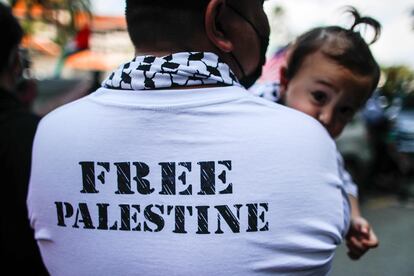Don’t forget Palestine
There is now extensive evidence that the government of Israel is blatantly violating international law in its rule over the occupied Palestinian lands and its oppressive practices against the Palestinian people. As a friend of Israel, I feel obliged to speak out

The world’s reaction to Putin’s invasion of Ukraine is rightly one of horror. Political leaders are turning to the rules-based international order to counter this unjustified act of aggression. Yet we must not forget that the neglect of these global rules and norms around the world has long undermined peace and security, and enabled impunity - not least in the Israeli-Palestinian conflict. To reverse this dangerous trend, leaders must uphold these rules and norms everywhere. Double standards can undermine the case for justified action.
For decades, the Israeli-Palestinian conflict has been aggravated by the international community’s failure to call out systematic violations of international law. There is now extensive evidence that the government of Israel is blatantly violating international law in its rule over the occupied Palestinian lands and its oppressive practices against the Palestinian people. As a friend of Israel, I feel obliged to speak out.
While president of Colombia, I led the peace process that ended a decades-long civil war. In helping my country end this brutal conflict, I realized that a durable peace was only possible through a political resolution based on equal rights, justice and inclusion. These same principles motivated my decision as president to recognize the State of Palestine in 2018, which brought me much criticism in certain parts of Israel and in my own country.
As a friend of Israel, I am increasingly concerned that recent Israeli governments have shown no intention of applying the values of equality and liberty enshrined in their Declaration of Independence to the territory they have occupied since 1967. They continue to deny the basic principle of equal rights, and prevent the creation of a Palestinian state.
That patriotic Israelis and respected international figures are using the term “apartheid” reinforces the need for an objective debate on the evidence, grounded in the international legal framework that defines the crime
I fully support Israel’s right to exist and to defend itself. It has been attacked many times, and that must stop. But these attacks do not justify the government’s system of discrimination and oppression, and the widespread human rights violations that Palestinians under occupation suffer every day. The de facto annexation of the West Bank and East Jerusalem, through the unchecked expansion of illegal Jewish settlements, is a clear indication of Israel’s intent to permanently dominate a stateless Palestinian people.
The evidence makes it difficult for any impartial observer not to conclude that millions of Palestinians are subject to a cruel and intolerable system of military occupation and the denial of basic human rights.
Prominent Israeli political, legal and military figures have warned for years that apartheid would materialize if the policies of occupation and illegal settlement continued. Many even say that perhaps this has now come to pass, including a former Attorney General and a former Director of Shin Bet, the Israeli security agency. Leading international figures such as former UN Secretary-General Ban Ki-moon (my fellow Elder) are drawing similar conclusions.
The word “apartheid” carries huge emotional and historical weight for people all over the world. It should be used as a legal term, not a political accusation. Whether the crime of apartheid is being committed by the government of Israel is a legal question decided by the evidence, not a matter of allegiance or ideology.
That patriotic Israelis and respected international figures are using the term “apartheid” reinforces the need for an objective debate on the evidence, grounded in the international legal framework that defines the crime. I and my fellow Elders would welcome such a debate as a step towards greater understanding on all sides.
Instead, we are witnessing an orchestrated effort by the Israeli government and its allies to shut down criticism and persuade the Israeli public and foreign allies that there is no substance to such a discussion – but without addressing the evidence. Those setting out the evidence face denigration, accusations of anti-Semitism and even criminalization.
This includes a refusal to accept investigations by international bodies into human rights violations and crimes of atrocity by all parties to the conflict, including Hamas.
Yet the sands may be shifting. The unprecedented global support for the International Criminal Court’s investigation into Russia’s invasion of Ukraine challenges the inertia shown by the international community to war crimes and crimes against humanity committed elsewhere. Impunity in Israel and Palestine is as intolerable as it is in Ukraine - or anywhere else.
In calling for international law to be respected, I do not question Israel’s legitimacy or the right of its people to live in peace and security. Quite the opposite: what is at stake is not just the equal rights of all Palestinians and Israelis, but the integrity of Israel’s founding ideals of dignity, justice and freedom, and its willingness to respect the rule of law based on the evidence. Friends of Israel should call that out.
Tu suscripción se está usando en otro dispositivo
¿Quieres añadir otro usuario a tu suscripción?
Si continúas leyendo en este dispositivo, no se podrá leer en el otro.
FlechaTu suscripción se está usando en otro dispositivo y solo puedes acceder a EL PAÍS desde un dispositivo a la vez.
Si quieres compartir tu cuenta, cambia tu suscripción a la modalidad Premium, así podrás añadir otro usuario. Cada uno accederá con su propia cuenta de email, lo que os permitirá personalizar vuestra experiencia en EL PAÍS.
¿Tienes una suscripción de empresa? Accede aquí para contratar más cuentas.
En el caso de no saber quién está usando tu cuenta, te recomendamos cambiar tu contraseña aquí.
Si decides continuar compartiendo tu cuenta, este mensaje se mostrará en tu dispositivo y en el de la otra persona que está usando tu cuenta de forma indefinida, afectando a tu experiencia de lectura. Puedes consultar aquí los términos y condiciones de la suscripción digital.









































